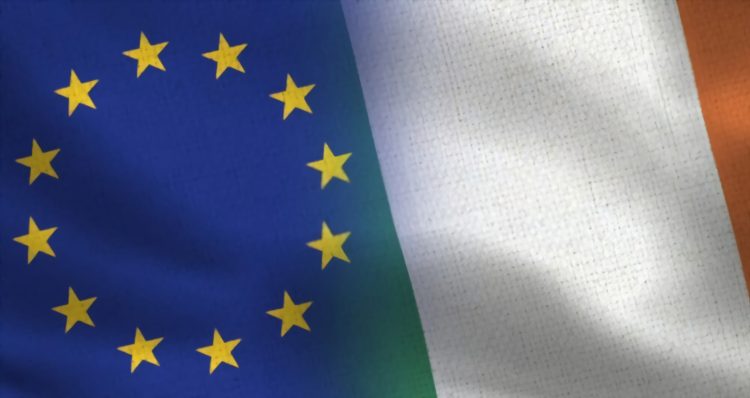The tendency for Northern Ireland to secede from Britain has increased in recent months among its citizens. Gerry Adams, a politician and former Sinn Fein leader, hoped that a referendum on secession from Britain would be possible in three years. Polls show that 42% of Northern Irish people want to join the Republic of Ireland, and about 10% have not yet reached a definite conclusion. The growing desire for Ireland to withdraw from Britain has accelerated since Brexit. Unlike British citizens, residents of Northern Ireland wanted to continue their presence among EU members, and now that the British have left Europe, the Irish want to join Southern Ireland to return to the EU.
Background
Ireland was divided into northern and southern parts by a law passed by the British Parliament, which was intended to guarantee British sovereignty over both parts, but history, the fate of Ireland and the law changed that. For the past two years, as Northern Ireland has repeatedly called for a referendum on independence from Britain, London officials have strongly opposed it.
Belfast unrest
What has happened in Northern Ireland in recent months has been somewhat unprecedented or even unprecedented in the five centuries of British occupation of this part of the Isle of Man, as loyalists to the throne of London felt threatened and revolted by the impossibility of the monarchy’s continued rule. Widespread riots in the streets of Belfast and other cities, though re-establishing the old divide between the Orange Orders and the Greens, are different from the past.
The gap goes back to the bloody Battle of Boyne in June 1690, when the Orange Protestant Army led by William III, King of the Netherlands, defeated the army of Jack I, then Catholic of England, and since then this sectarian division has formed in the British Isles.
Irish oranges
As the British monarchy shifted to the Protestant Church, the Irish oranges have become pro-British appendices in recent centuries. Last April, they rose in despair from continuing to occupy the northern part of the Big Island, west of the British mainland, and at the same time clashed with both their Green counterparts and the British police. The Northern Ireland Police, which is a subdivision of the British police, conceals the fact that the insurgents are largely affiliated with militant groups loyal to the annexed Protestants.
Oranges vs protesters
The Council of Loyal Communities, which is made up of pro-British militant groups denied the allegations in unison with the police. This shows the great difference that exists between the Oranges and the protesters themselves, who represent the Protestant majority in Northern Ireland. The riots even overshadowed the march to commemorate the death of Prince Philip a clear sign of the gradual death of the British Empire, which is collapsing from inside Buckingham Palace and lacks the strength and will to occupy nearby colonies such as Northern Ireland.
PM’s position
Prime Minister Boris Johnson also called for an end to the violence, without mentioning the riots in recent months, but now everyone knows that Brexit, of which Johnson himself was a major political supporter, is the mainstay of the Northern Ireland riots.
Micheal Martin and Johnson were unable to bring peace to Northern Ireland, and the US government sought to mediate. Brexit led to a “Good Friday” peace agreement signed between the government of London and the Belfast Regional Government to end sectarian violence in Northern Ireland, ending many decades of conflict between Britain and its supporters and Irish nationalists.
From civil war to the “Good Friday” agreement
Northern Ireland was the scene of a civil war between pro-accession Republican Catholics in the 1980s and 1990s led by the Irish Republican Army with pro-monarchist Protestants. The British army and the Orange attacked the nationalists, and in return, they avenged their victims by bombing the British military and civilians. After the majority of the people of Northern Ireland voted against Brexit, unlike the British, the social equations of the region were tangled around proximity to Britain or the European Union. Following the implementation of the British secession from the European Union, some of the most important clauses of “Good Friday”, including Britain’s commitment to the non-establishment of border customs with Northern Ireland, have disappeared.
Unity proposal and Brexit
The Republic of Ireland, which covers the largest part of the island with a Catholic majority, extended a hand of friendship to the nationalists and the greens of Northern Ireland on behalf of the European Union. With the removal of the customs border between the two northern and southern parts, the oranges, who see the shadow of the queen being dismantled, felt threatened. Many accession unions are strongly opposed to the new trade barriers imposed as part of Brexit between Northern Ireland and other parts of Britain, notably England, Wales and Scotland. In other words, Brexit would overthrow the old order that had been ruled by London over Northern Ireland, and the new order would effectively take over by violating the Good Friday agreement, which would mark the resumption of social strife.
When the referendum was approved by the British people, the demarcation of the borders of Northern and Southern Ireland was one of the first demands made by the Republic of Ireland and, consequently, the European Union.
British officials’ reactions
The issue was not considered a top priority by London officials, as former British Foreign Secretary Liam Fox said, unless London reached an agreement with Brussels and no idea of a final status was drawn, any questions about the common border would remain unanswered.
From the very beginning of the Brexit negotiations, the British insisted that they were committed to maintaining the current state of Ireland’s borders. But the passage of time and the clarification of the dimensions of the issue after several rounds of intensive and complex negotiations showed that, contrary to London’s perception, it was the Irish borders that determined the fate of the negotiations and agreements and became an obstacle for Britain to reach a final agreement.
May’s failure
Former British Prime Minister Theresa May worked hard to remove this obstacle. Eventually, she and the European Union were able to reach common ground by proposing a system called “support arrangements”. The “support arrangements” were a kind of guarantee policy that prevented the return of the hard borders between the two Ireland. This guarantee policy was based on the fact that the United Kingdom would remain in the customs union until a new framework for trade relations with the European Union was established, thus maintaining Northern Ireland with its former border conditions for an indefinite period.
Despite the Europeans’ acceptance of the plan, the British representatives and parties did not welcome it. The most important objections to the plan were the uncertain timing of the plan, London’s remaining and being caught up in the Union’s laws and customs, and ultimately the weakening of the government’s national sovereignty over its territory. Although Theresa May announced to the union during her hasty overnight visit that some of these shortcomings had been rectified, according to the leader of the British Liberal Democrats, the late-night agreements in Strasbourg and the issuance of a statement out of desperation confirmed the chaos in the Brexit case. Following Theresa May’s failure to meet the Irish border challenge that led to her resignation and the fall of her cabinet, the election of Johnson, a staunch opponent of the “support arrangements”, has fueled the confusion.
Johnson’s vague policy
Many believe that Johnson deliberately pursued a policy of procrastination to achieve a Brexit without agreement. Of course, the prime minister proposed a new solution that many analysts have considered reactionary and even fraudulent.
Johnson’s new plan combines the establishment of exchange control centres with compliance with EU common market rules on the island of Ireland. After leaving the union, Britain intended to be able to enforce independent trade rules and regulations throughout the country, including even in Northern Ireland. But in the meantime, Northern Ireland can comply with the rules and regulations of the Union for a limited period to be determined by London, provided that the exchange centres inspect the goods imported from this region to the United Kingdom.
In fact, instead of setting up border checkpoints, the administrative processes of exchanging goods through centres of origin and destination should be done using intelligent systems. Johnson’s plan was so complex and ambiguous that the MEP saw it as a collection of bad ideas that were almost impossible to implement. Some see it as a kind of setback, as it has abandoned backup arrangements in practice and ignored previous assurances about the status of Ireland. But the worst view is that Johnson started the game of finding the culprit and wanted to make Europe the main culprit for the failure of the negotiations by presenting such plans.
Conclusion
The Unionists who have dominated Northern Ireland since secession are mostly Protestants who see their identity as tied to Britain either because they support the British government, because of the British monarchies, or because they support the royal family as the last defender of the monarchy. Even before the Sinn Fein Party won in the south, Peter Robinson, the former leader of the Democratic Unionist Party, advised his fellow believers to prepare for a referendum. The people of Northern Ireland do not disagree with the idea of a united Ireland but have long wondered if such a thing is worth doing. Now that the alliance brings them back to the European Union, they may find an incentive to move on. The Council of Europe has confirmed that the entire territory of a united Ireland will be part of the Union. Moreover, the growing desire for Ireland to secede from Britain has accelerated since Brexit. Unlike British citizens, residents of Northern Ireland wanted to continue their presence among EU members, and now that the British have left Europe, the Irish want to join Southern Ireland to return to the EU.





























